Type 1 diabetes: Parents describe fight for school care
- Published
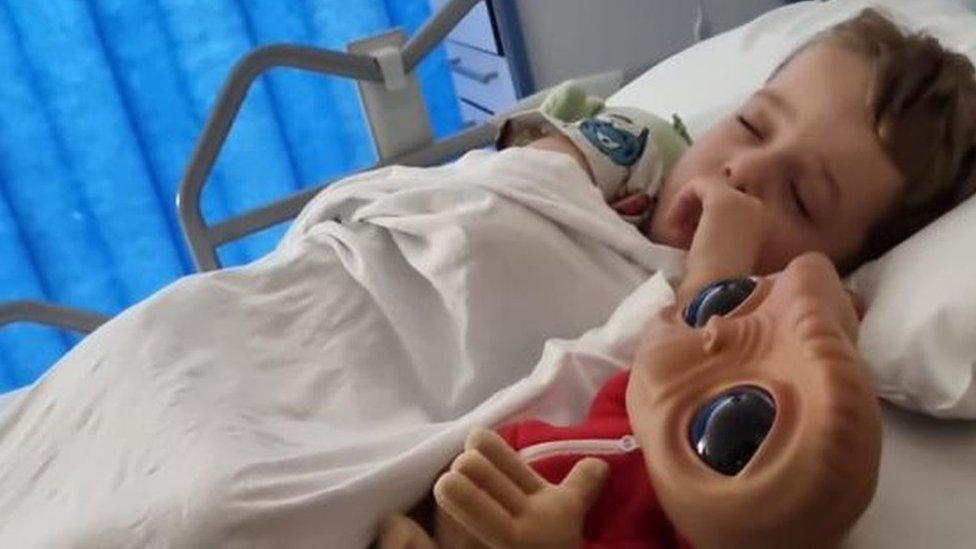
Six-year-old Toby was diagnosed with the condition when he was 18 months old
Parents of children with type 1 diabetes say they are having to fight to get appropriate care for their child at school.
One mum said caring for her seven-year-old was "ridiculously intense" for school staff but the process for securing one-to-one care was unclear.
A man whose son has a designated carer at school said it was life-changing.
Diabetes UK said some children had excellent support but many struggled to be fully involved in school life.
Six-year-old Toby was diagnosed with the condition when he was 18 months old.
"Since his diagnosis I've been constantly fighting for the care he needs," his mother Zoe, from Cardiff, said.
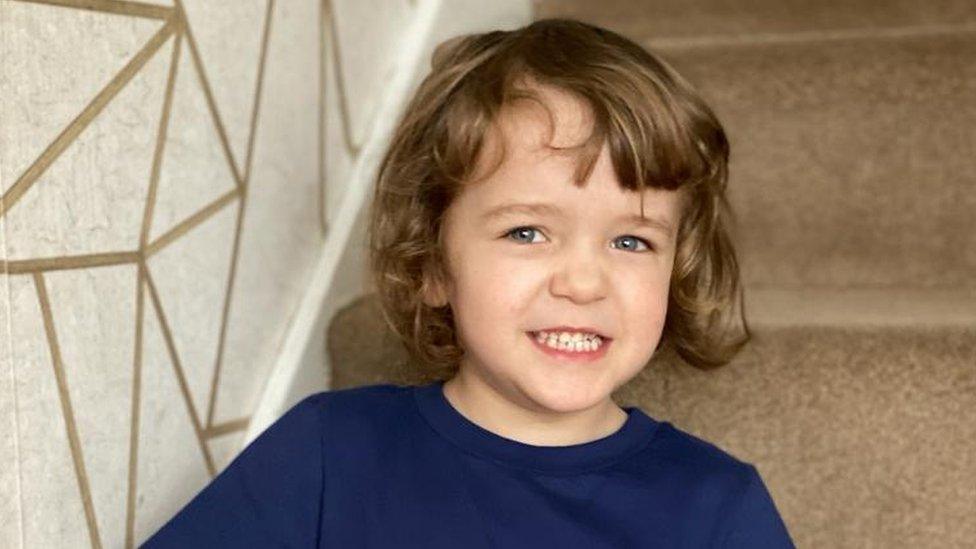
Toby was once in a diabetic coma as a baby
She said a teaching assistant (TA) at his school has been trained to look after him which involves monitoring his insulin pump, external throughout the day, checking his blood sugar levels through a sensor he wears and by pricking his finger every time he eats, manually entering his blood sugar levels into his pump and being vigilant for hypoglycaemia (low blood sugar levels) and hyperglycaemia (high blood sugar levels), which can make him floppy or his behaviour challenging.
She said the TA was "brilliant with him" but has to care for him alongside her other responsibilities to the rest of the class - something she believes is not appropriate.
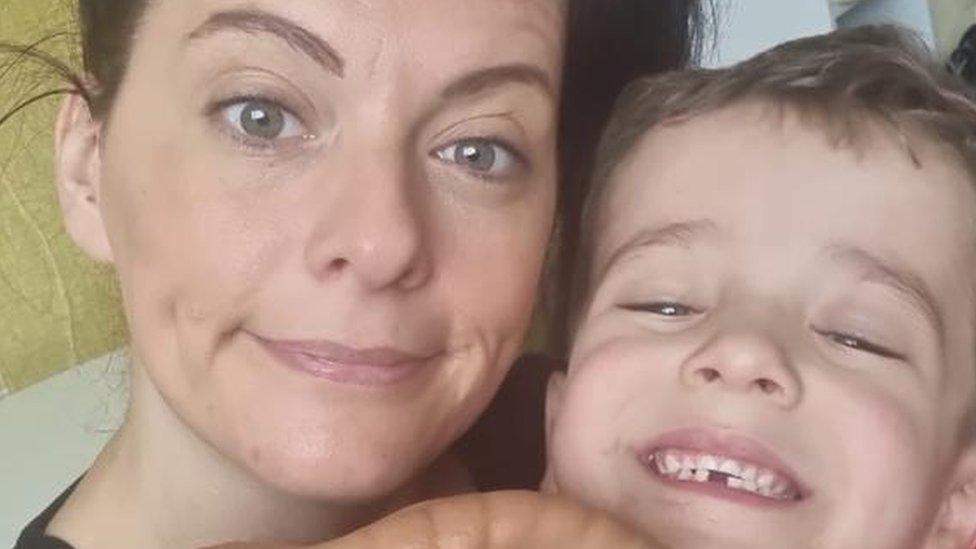
Zoe wants her six-year-old Toby to receive one-to-one care for his diabetes when he is at school
"He needs proper care," she said.
"I get constantly called into the school to change [his pump], monitor it and look after it."
Zoe has been told the TA who has been responsible for Toby's care for the past two years is no longer available to him after September and the school has applied to the council for funding for one-to-one support at school.
"I have been told that it's not a guarantee, with the local council it's really hard to get any help at all for him," she said.
Zoe is only too aware of the dangers of her child's condition. Just before he was diagnosed he became very unwell and was in a diabetic coma.
"His condition is life-threatening," she said.
Cardiff council said the health, wellbeing and safeguarding of pupils was a priority and there were well-established processes in place for schools to seek advice, training and additional resources to ensure learners are safe in school and their healthcare needs are met.
'No different from any other child'
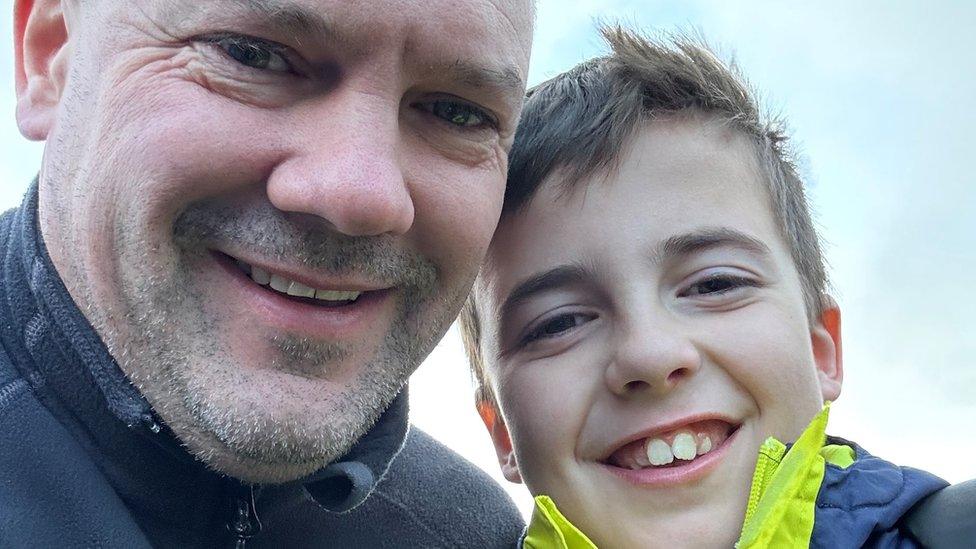
Chay's nine-year-old son Blyth has had the same person providing him with one-on-one support at school for over four years
Nine-year-old Blyth was diagnosed with type 1 diabetes five years ago and has had the same person providing him with one-to-one support at school for over four years.
His dad Chay, from Vale of Glamorgan, said he felt extremely fortunate for the care his son was receiving but it had been a challenge to get it.
He said he was initially told he or his wife would have to come into school to provide care, which prompted him to arm himself with the right information about what the school should be providing.
Blyth's paediatric diabetes team provided a letter to say Blyth could not care for his condition himself and needed a responsible adult to monitor him constantly at school and this formed part of the school's successful application to the council for one-to-one care.
"Because of the one-to-one support that he receives he is just completely normal, his schooling is normal, everything is a positive school experience and he is no different from any other child," said Chay.
He said Blyth was recently able to go on a three-day residential trip where both his day and night care was fulfilled.
He said having the same person providing care throughout Blyth's time at school had helped him no end.
"She knows him perfectly, she's just so in tune with him and she's a necessary part of his schooling.... a massive part of his life," he said.
"I know that some people do struggle, and I know that they have this fight that they shouldn't have."
Chay said he would like to see the rights of children with type 1 diabetes made much clearer.
'So overwhelmed'
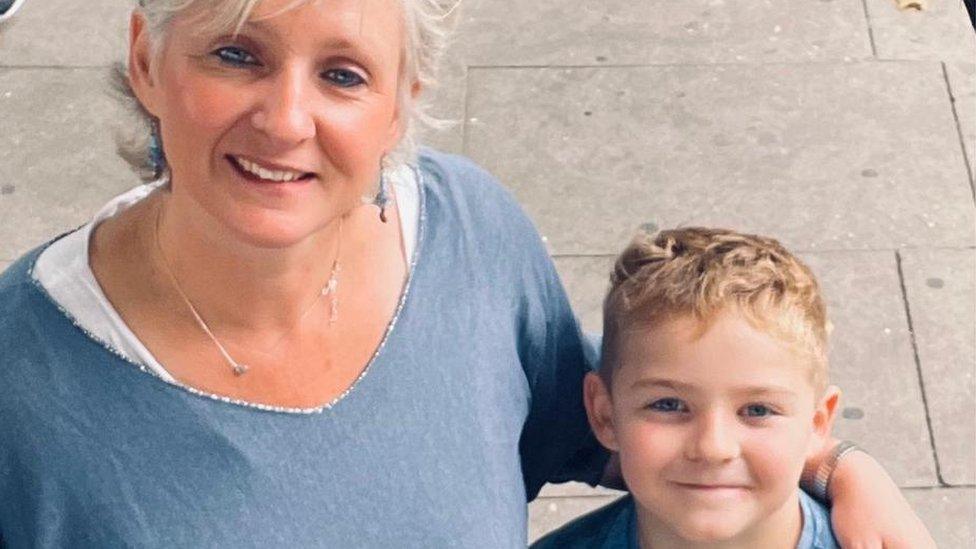
A number of staff at Joe's school have been trained to manage his diabetes
Sandra's seven-year-old son Joe was diagnosed with the condition in March.
A number of staff at Joe's school in Powys, have been trained to manage his diabetes but Sandra said she would love the school to have someone with the sole job of managing his care.
On hearing about the one-to-one support Blyth receives at his school, she said: "I feel quite emotional actually hearing that."
At Joe's school, each time he needs insulin the head teacher, his class teacher or a teaching assistant takes him out of the class to get it, working out how much to give him using a phone app.
"When his alarm goes off they have to respond and it might go off every five minutes for an hour... I constantly feel guilty to the school and I just think of all those children that are losing out because of the intensity of support needed to manage him," she said.
"I see how tough it is for the staff... there is a lot of fear and a lot of learning the staff have had to step up to.
"Nearly all of the school have done the training which I'm blown away by but it's still ridiculously intense for them."

Joe, pictured with his sister, was diagnosed with type 1 diabetes in March
The process of trying to get council funding for one-to-one care for Joe has not yet begun.
"You're so overwhelmed there's just no way it's on your agenda... you're just managing 24 hours of being awake and stabilising Joe's blood sugar," said Sandra.
She said she wished her child could get one-to-one support "without having to go through a process where you're fighting for something".
She said she had spoken to Joe's head teacher about starting the process, adding: "She [the head teacher] said it would have to go to a panel... why do we have to justify it to a panel? You know, it's pretty straightforward... this is a very straightforward diagnosis."
She said much of the process for getting additional help was still a mystery to her.
"Who does it? I don't know. Is it me? Is it the head? Can they [the school] go through that? They're eight teachers down with sickness at the moment."
She thinks the onus to ensure sufficient care is being provided should be on the council rather than relying on an already stretched parent and school to fight for it.
"I just asked [the head teacher]: 'Have you ever been contacted by the local council about having a type 1 diabetic child in your school?' She said: 'Never'.
"There's been nothing and I'm blown away by it, blown away."
"If I wasn't a proactive mum, for whatever reason, it would be to the detriment of my son's health."
Powys County Council said it could not comment on individual cases but all its schools were aware of the processes for referring to the council for additional support and guidance.
"All schools in Powys follow the Welsh government statutory guidance - Supporting Learners with Healthcare Needs, external," it added.
What rights do schoolchildren with type 1 diabetes have?
The Equality Act 2010 legally defines children with diabetes as people living with a disability. As such, education institutions and the NHS must ensure students living with diabetes are not disadvantaged.
The Welsh government said parents should inform their school of their child's healthcare needs and the school should discuss with them whether an individual healthcare needs plan (IHP), external might be needed.
An IHP sets out what is required to support a learner with healthcare needs and is essential for learners with complex, fluctuating or long term healthcare needs.
The Additional Learning Needs Education Tribunal (Wales) Act 2018, external sets out how children and young people under 25 years old with additional learning needs should be supported.
Danni Quinn, who has a son with the condition and has run the T1 Children - Rights at School Facebook group for over 10 years, said she advises parents who are unhappy with their child's support at school to request assessment for an Individual Development Plan (IDP), external in Wales, an Education, Health and Care Plan (EHCP) in England and Co-ordinated Support Plan (CSP) in Scotland.
'We have to listen to parents'
"It's often down to the parents and the teachers to make the case for that child and to justify what support that child needs... children generally in primary school do need one-to-one support, certainly in the first years after diagnosis," explained Dr Robert French, a senior research fellow at Cardiff University's School of Medicine.
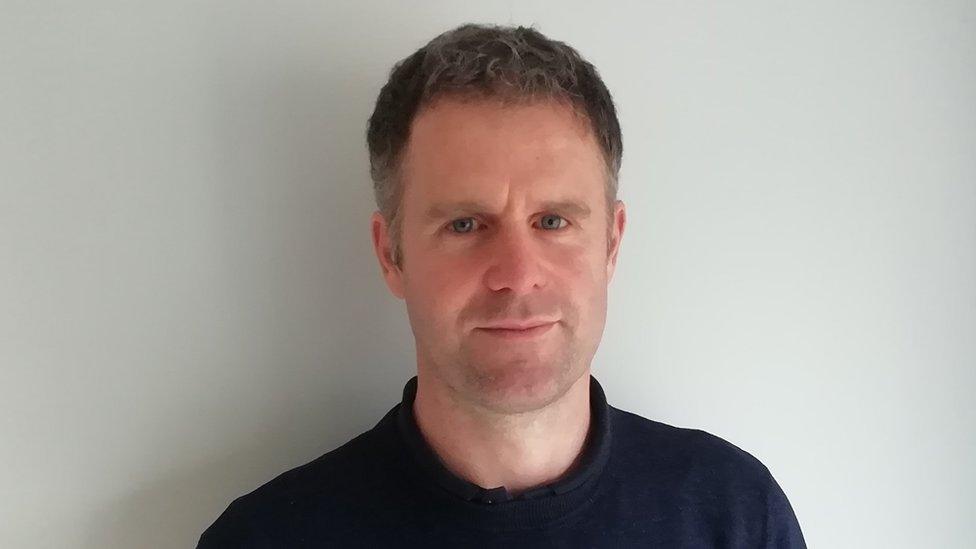
Dr Robert French says children with type 1 diabetes in primary school generally need one-to-one support and "certainly in the first years after diagnosis"
Dr French said the levels of support children with the condition received at school was "inconsistent" across Wales.
"We have reports from parents about really having to fight for the support their child needs in school," he said.
"I think in most cases one-to-one support for the early years key stage one is probably essential.
"We have to listen to parents and it shouldn't be on a resources question or what that school can do, I think it should be based on the child's need, as the additional learning needs act, external was designed to be.
"There's loads of examples of fantastic care across Wales and I think it's just making sure that always the case."
Dr French is the lead author of a recent study that found children living with type 1 diabetes miss an average of nine more sessions (half days) of school a year compared to children without the condition.
The study, published in the Journal for Diabetes Care, also found that while many children with diabetes still performed well in their education, both at age 16 and in university, those facing struggles to manage their blood glucose levels achieved results that are five grades lower in GCSEs than children without the condition and were also less than half as likely to attend university.
He hopes new immunotherapy drugs that delay the development of type 1 diabetes could give young children "a chance to get through some of their schooling and take on diabetes when they're a bit more mature and a bit more settled".
Charity Diabetes UK said there were about 1,400 children and young people with type 1 diabetes in Wales.
It said it regularly heard from parents who have had to attend school to support their child, and in some cases, children have been unable to attend school for long periods of time.
The Welsh government said its Supporting Learners with Healthcare Needs guidance , externalcontained both statutory guidance and non-statutory advice to assist local authorities, governing bodies, education settings, education and health professionals and other organisations to support learners and ensure minimal disruption to their education.
It added: "The statutory guidance requires local authorities and education settings in Wales to have a healthcare needs policy in place which should seek to ensure that pupils with any medical condition, including diabetes, are properly supported."
Related topics
- Published18 November 2022
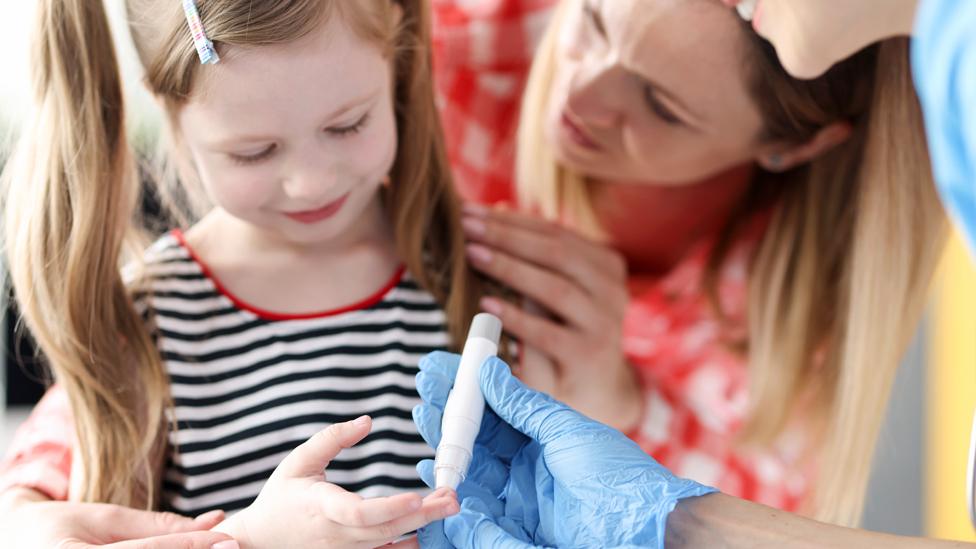
- Published9 May 2022
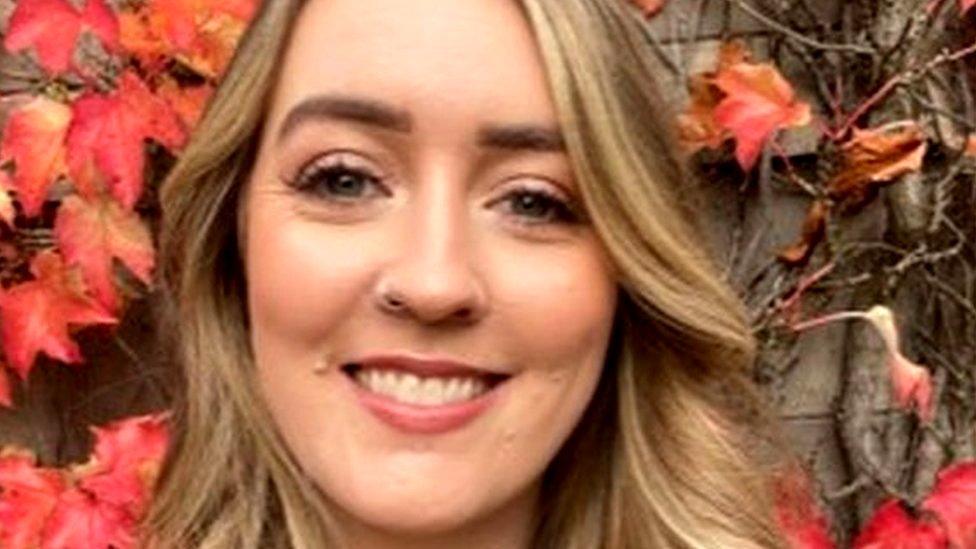
- Published15 November 2022
